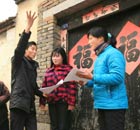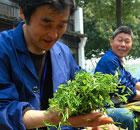Government and Policy
Govt wants a better view of 'naked officials'
By Xie Yu (China Daily)
Updated: 2010-02-24 07:26
 |
Large Medium Small |
A special monitoring system is likely to be set up within the year to better watch officials who have spouses or children living abroad, as a measure to curb corruption.
The National Bureau of Corruption Prevention and the Ministry of Supervision jointly listed supervision over so-called "naked officials" as a key task.
The term "naked official" was selected as one of China's top 10 buzzwords of 2009 by Chinese linguists. It refers to officials whose family members have moved overseas, while they themselves work in the country alone, usually with the other country's visa in hand.
The move coincides with a requirement of the Central Committee of the Communist Party of China (CPC) to promote a revised code of ethics for CPC members to ensure clean practice in their work.
The guidelines specify 52 unacceptable practices for CPC officials, including accepting cash or financial instruments as gifts, and using their influence to benefit their spouses or children regarding employment, stock trading or business.
The guidelines also prohibit CPC officials from for-profit activities and abusing public funds for personal interests, and warned of "strict punishment" to violators.
Lin Zhe, an anti-corruption professor with the Party School of the Central Committee of the CPC, said she expects a specific regulation to be issued this year requiring "naked officials" to report their personal and family information.
"We have had similar reporting requirements before, but they were too general. The new regulation should demand such officials report in detail, as details often reveal problems," she said.
For example, an official should report the exact overseas school his child studies in, how the child was admitted, how much tuition fees and living expenses are, as well as where the money is from, with relevant proof or receipts.
"A Chinese student needs about 200,000 yuan ($30,000) a year for studying in the UK. At least the official should explain how he or she can afford it," she said.
Meanwhile, once the reporting system is set up, related departments should adopt a strict check-up if "naked officials" apply to go abroad.
Lin also mentioned the monitoring role played by banks. "I suggest the list of 'naked officials' be provided to banks, so they can be very cautious and report to the authorities if there is a large sum of money moving in their account," she said.
However, He Zengke, a professor with the China Center for Comparative Politics and Economics, said it is more urgent to set up a personal assets reporting system.
"It would provide a more rigorous and direct supervision over the officials, as the purpose of graft is to pursue personal fortune. Several nations like the US and France have set up similar systems, and we can learn from their experience," he said.
About 4,000 corrupt officials fled the country with at least $50 billion between 1978 and 2003, a report by the Ministry of Commerce showed. Many of these officials sent their spouses and children abroad first, then transferred the money they took from China.
In 2008, Pang Jiayu, former mayor and Party chief of Baoji in Northwest China's Shaanxi province from 1997 to 1999, was accused of allowing substandard pipes to be used and sentenced to 12 years imprisonment for corruption.
But Pang's wife and son had emigrated to Canada in 2002, causing great concern in the public over corrupt officials relocating their "dirty money" abroad.
A communique, issued by the fifth plenary session of the 17th Central Commission for Discipline Inspection of the CPC this January, stipulates that officials should report their property and investments as well as the employment of their spouse and children, and authorities should particularly monitor those officials who had family members living overseas.
The Shenzhen municipal government issued a regulation in November 2009, stipulating that "naked officials" were prohibited from serving as leading officials in major Party and governmental departments.
As the "two sessions", or annual sessions of the National People's Congress, the top legislature, and the Chinese People's Political Consultative Conference, the top advisory body, are approaching, online surveys show that corruption remains the No 1 concern among Chinese people.
Xinhua contributed to the story











